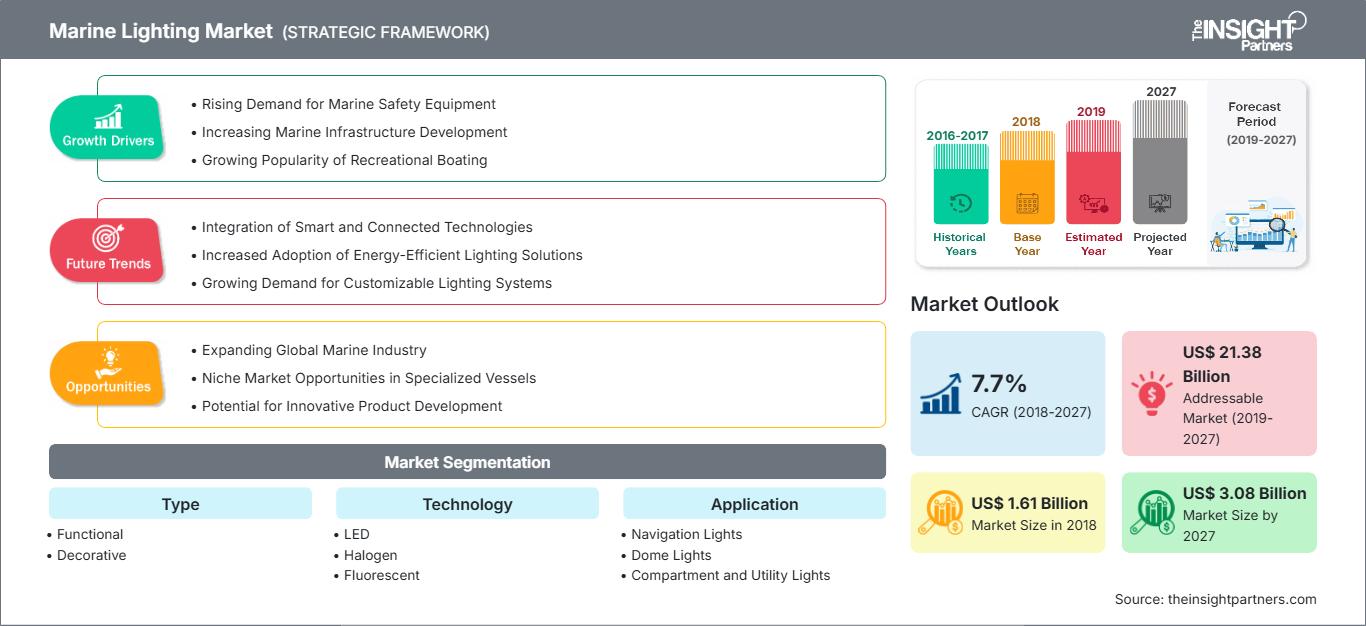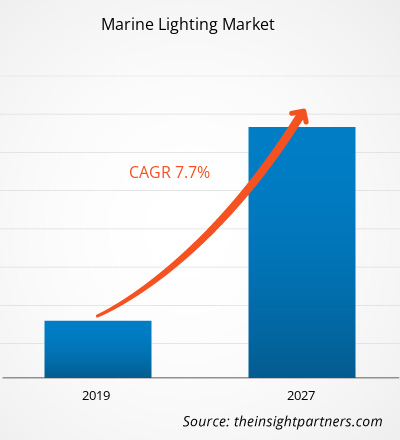Marine Lighting Market Key Players and Forecast by 2027
Marine Lighting Market to 2027 - Industry Analysis and Forecasts By Type (Functional, and Decorative), Technology (LED, Halogen, Fluorescent, Xenon), Application (Navigation Lights, Dome Lights, Compartment and Utility Lights, Safety Lights, Docking Lights, and Others); End-user (Commercial Ships, Passenger Ships, and Others)
Historic Data: 2016-2017 | Base Year: 2018 | Forecast Period: 2019-2027- Report Date : Dec 2019
- Report Code : TIPRE00007106
- Category : Electronics and Semiconductor
- Status : Published
- Available Report Formats :


- No. of Pages : 184
The global marine lighting market accounted for US$ 1,611.96 Mn in 2018 and is expected to reach US$ 3,083.73 Mn by 2027 with a CAGR growth rate of 7.7% during the forecast period.
APAC led the marine lighting market owing to the presence of a robust shipbuilding industry, with China, South Korea, and Japan being the three shipbuilding nations worldwide. Other factors, such as increasing global trade as well as and maritime regulations are among other factors that, have generated the demand for commercial ships, which has, in turn, led to the growth in the marine lighting market. China is anticipated to hold the largest share of the marine lighting market owing to the presence of robust commercial shipbuilding, such as bulk cargo ships and tankers. Moreover, South Korea is witnessing a high demand from the global market for LNG vessels. Moreover, other developing economies in the APAC region are also witnessing high growth in their shipbuilding and repair industry industries. Also, developed economies worldwide are noticing a high need for retrofitting in their aging fleet, thus thereby propelling the marine lighting market.
Customize This Report To Suit Your Requirement
Get FREE CUSTOMIZATIONMarine Lighting Market: Strategic Insights

-
Get Top Key Market Trends of this report.This FREE sample will include data analysis, ranging from market trends to estimates and forecasts.
Market Insights
Increasing shipbuilding activities propelling the demand for the marine lighting market
The shipbuilding activities are growing across the globe, especially in the markets such as China and the US, owing to the increasing number of travelers and trade activities. The increasing shipbuilding activities across the globe are expected to influence the growth of marine lighting solutions positively. The growing seaborne trade activities across the globe owing to the healthy trade relation is another factor fueling the shipbuilding industry, which would result in increasing the demand for marine lighting solutions.
Growing adoption of LED lighting solutions offer a lucrative opportunity to the marine lighting market
The ship owners are installing LED lighting solutions to reduce the power consumption and operating costs of the ship. LED lighting solutions are also less vulnerable to get damaged by water; therefore, they are used in underwater lamps. The marine lighting market is undergoing an evolution from traditional lighting technologies to LED lighting solutions based on the user’s requirements, which is creating a high demand for LED marine lighting solutions.
Type Insights
The global marine lighting market, by type, has been segmented into functional lights and decorative lights. Functional lights provide the necessary lights for performing various operations and ensuring the safety of the vessel, while the decorative lights help improve the ambiance of the ship. The increasing number of commercial ships is a significant factor in driving the growth of the functional marine lighting market. However, the growing popularity of luxury vehicles is the major factor driving the growth of the decorative marine lighting market.
Application Insights
The global marine lighting market by application was led by the compartment and utility segment in 2018. When operating a vessel at night, it is vital for operators to maintain the capability to see underfoot, devoid of losing their night vision with a harsh, bright glare. Thus, utility light is required to illuminate deck areas as well as passageways, improving a boat's safety and overall ambiance. Further, boat utility lights can help direct light to precise areas requiring special attention.
End-user Insights
The global marine lighting market based on end-user is segmented into the commercial ship, passenger ship, and others. In commercial ships, lighting solutions play an important role in navigation, safety, and operations. In passenger's vessels, the design of the lighting solutions should match the interior and exterior design of the ship to make the ambiance appealing. The marine lighting solutions are known for their high energy consumption. Therefore, there is a shift of focus toward adopting energy-efficient solutions among the end-user segments. The marine lighting market by end-user is estimated to be dominated by commercial ships throughout the forecast period.
Marine Lighting Market Regional InsightsThe regional trends and factors influencing the Marine Lighting Market throughout the forecast period have been thoroughly explained by the analysts at The Insight Partners. This section also discusses Marine Lighting Market segments and geography across North America, Europe, Asia Pacific, Middle East and Africa, and South and Central America.
Marine Lighting Market Report Scope
| Report Attribute | Details |
|---|---|
| Market size in 2018 | US$ 1.61 Billion |
| Market Size by 2027 | US$ 3.08 Billion |
| Global CAGR (2018 - 2027) | 7.7% |
| Historical Data | 2016-2017 |
| Forecast period | 2019-2027 |
| Segments Covered |
By Type
|
| Regions and Countries Covered |
North America
|
| Market leaders and key company profiles |
|
Marine Lighting Market Players Density: Understanding Its Impact on Business Dynamics
The Marine Lighting Market is growing rapidly, driven by increasing end-user demand due to factors such as evolving consumer preferences, technological advancements, and greater awareness of the product's benefits. As demand rises, businesses are expanding their offerings, innovating to meet consumer needs, and capitalizing on emerging trends, which further fuels market growth.

- Get the Marine Lighting Market top key players overview
Marine lighting solutions provided by the players vary in scale based on the size of vendors as well as their ability to manufacture hardware. Few of the recent developments are listed below:
- 2019 : R. STAHL TRANBERG launched the TRANBERG BlueLine Lighting Series. It is a comprehensive range of high quality, economical next-generation lighting for the marine industry.
- 2018 : Hella unveiled Sea Hawk 470 LED lamps suitable for illuminating decks as well as walkways beside ships and other related applications.
- 2017 : ITC introduced, VersiControlTM, RGB lighting control system for the marine industry. The solution offers ability to individually control the lighting with an all-in-one 4-zone control pad and/or a smartphone app.
GLOBAL MARINE LIGHTING – MARKET SEGMENTATION
By Type
- Functional
- Decorative
By Technology
- LED
- Halogen
- Xenon
- Fluorescent
By Application
- Navigational Light
- Dome Light
- Safety Light
- Compartment and Utility Light
- Docking Light
- Others
By End user
- Commercial Ship
- Passenger Ship
- Others
By Geography
-
North America
- U.S.
- Canada
- Mexico
-
Europe
- France
- Germany
- UK
- Italy
- Russia
- Rest of Europe
-
Asia Pacific (APAC)
- Australia
- China
- South Korea
- India
- Japan
- Rest of APAC
-
Middle East & Africa (MEA)
- Saudi Arabia
- South Africa
- UAE
- Rest of MEA
-
South America (SAM)
- Brazil
- Argentina
- Rest of SAM
Company Profiles
- DRSA
- ENSTO Group
- HELLA GmbH & Co. KGaA (Hella Marine)
- Innovative Lighting
- ITC Marine
- Lumiron, Inc
- Lumitec LLC.
- NJZ Lighting Technology Co., Ltd
- Phoenix Products LLC
- The Carlisle & Finch Co
Other Market Players from Value Chain:
Hangzhou Jaiwill Technology Co., Ltd., Signify, KOITO MANUFACTURING CO., LTD, Osram GmbH, TACO Marine, and Foresti & Suardi are few other market players from value chain which are not profiled in the report and can be included based on request.
Frequently Asked Questions
Naveen is an experienced market research and consulting professional with over 9 years of expertise across custom, syndicated, and consulting projects. Currently serving as Associate Vice President, he has successfully managed stakeholders across the project value chain and has authored over 100 research reports and 30+ consulting assignments. His work spans across industrial and government projects, contributing significantly to client success and data-driven decision-making.
Naveen holds an Engineering degree in Electronics & Communication from VTU, Karnataka, and an MBA in Marketing & Operations from Manipal University. He has been an active IEEE member for 9 years, participating in conferences, technical symposiums, and volunteering at both section and regional levels. Prior to his current role, he worked as an Associate Strategic Consultant at IndustryARC and as an Industrial Server Consultant at Hewlett Packard (HP Global).
- Historical Analysis (2 Years), Base Year, Forecast (7 Years) with CAGR
- PEST and SWOT Analysis
- Market Size Value / Volume - Global, Regional, Country
- Industry and Competitive Landscape
- Excel Dataset
Recent Reports
Related Reports
Testimonials
The Insight Partners' SCADA System Market report is comprehensive, with valuable insights on current trends and future forecasts. The team was highly professional, responsive, and supportive throughout. We are very satisfied and highly recommend their services.
RAN KEDEM Partner, Reali Technologies LTDsI requested a report on a very specific software market and the team produced the report in a few days. The information was very relevant and well presented. I then requested some changes and additions to the report. The team was again very responsive and I got the final report in less than a week.
JEAN-HERVE JENN Chairman, Future AnalyticaWe worked with The Insight Partners for an important market study and forecast. They gave us clear insights into opportunities and risks, which helped shape our plans. Their research was easy to use and based on solid data. It helped us make smart, confident decisions. We highly recommend them.
PIYUSH NAGPAL Sr. Vice President, High Beam GlobalThe Insight Partners delivered insightful, well-structured market research with strong domain expertise. Their team was professional and responsive throughout. The user-friendly website made accessing industry reports seamless. We highly recommend them for reliable, high-quality research services
YUKIHIKO ADACHI CEO, Deep Blue, LLC.This is the first time I have purchased a market report from The Insight Partners.While I was unsure at first, I visited their web site and felt more comfortable to take the risk and purchase a market report.I am completely satisfied with the quality of the report and customer service. I had several questions and comments with the initial report, but after a couple of dialogs over email with their analyst I believe I have a report that I can use as input to our strategic planning process.Thank you so much for taking the extra time and making this a positive experience.I will definitely recommend your service to others and you will be my first call when we need further market data.
JOHN SUZUKI President and Chief Executive Officer, Board Director, BK TechnologiesI wish to appreciate your support and the professionalism you displayed in the course of attending to my request for information regarding to infectious disease IVD market in Nigeria. I appreciate your patience, your guidance, and the fact that you were willing to offer a discount, which eventually made it possible for us to close a deal. I look forward to engaging The Insight Partners in the future, all thanks to the impression you have created in me as a result of this first encounter.
DR CHIJIOKE ONYIA MANAGING DIRECTOR, PineCrest Healthcare Ltd.Reason to Buy
- Informed Decision-Making
- Understanding Market Dynamics
- Competitive Analysis
- Identifying Emerging Markets
- Customer Insights
- Market Forecasts
- Risk Mitigation
- Boosting Operational Efficiency
- Strategic Planning
- Investment Justification
- Tracking Industry Innovations
- Aligning with Regulatory Trends




















 Get Free Sample For
Get Free Sample For